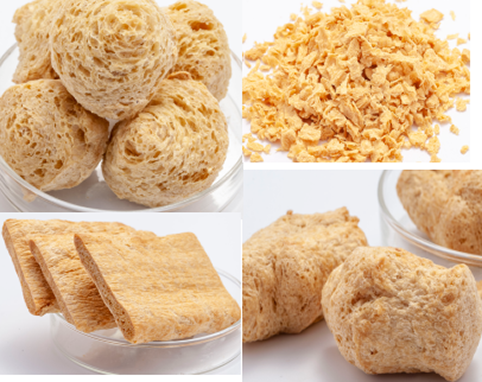A recent hot topic in the food industry is the rise and continued growth of plant-based foods. As people's awareness of health and environmental protection continues to increase, more and more people choose to reduce their consumption of animal foods and choose plant-based foods, such as plant-based meat, plant milk, soy products, etc. This trend has also promoted the booming plant-based food market, attracting more and more food companies to join this field.
Soy protein is a high-quality plant protein that is rich in amino acids and nutrients, and does not contain cholesterol and saturated fat. Therefore, the application of soy protein in meat products has attracted more and more attention and has been widely adopted, mainly in the following aspects:
1. Meat replacement: Soy protein has good protein quality and taste, and can be used as a high-quality protein substitute for meat. It can be used to produce simulated meat products, such as soy meatballs, soy sausages, etc., which can meet the needs of vegetarians and meat-reducing consumers.
2. Nutritional fortification: Adding soy protein to meat products can increase the protein content and improve the nutritional composition of the diet. In addition, the plant fiber in soy protein is also beneficial to intestinal health and helps to balance the dietary structure.
3. Cost reduction: Compared with pure meat products, adding an appropriate amount of soy protein can reduce production costs, while increasing the protein content of the product and enhancing the competitiveness of the product.
In general, the application of soy protein in meat products can not only expand the product categories and choices, but also improve the nutritional value and sustainability of the product, which meets the current consumer demand for health, environmental protection and diversification.
Soy protein products come in various forms, including:
1. Soy protein powder: This is a concentrated form of soy protein that can be added to smoothies, shakes, or baked goods to increase their protein content.
2. Soy protein bars: These are convenient, on-the-go snacks that provide a quick and easy way to consume soy protein.
3. Soy protein isolate: This is a highly refined form of soy protein that contains a high percentage of protein and minimal amounts of fat and carbohydrates. Used for high temperature meat products, meat sausage, emulsified sausage, fish meat and other seafood, quick- frozen conditioning products, also can be used for rolling products.

4. Soy protein meat substitutes: These are products that mimic the texture and taste of meat, making them a popular choice for vegetarians and vegans looking to increase their protein intake.

Soy protein products are often used by individuals looking to increase their protein intake, especially those following a vegetarian or vegan diet. They are also a good option for people with lactose intolerance or dairy allergies who need an alternative source of protein.
In addition, food safety and traceability are also one of the hot topics in the food industry recently. Consumers' attention to food safety and quality continues to increase, requiring food companies to provide more information about the food production process and the source of raw materials. Some food companies have begun to strengthen the transparency of the production process, provide consumers with more information through the traceability system, and enhance consumer trust and loyalty. This trend of focusing on food safety and traceability has also pushed the food industry to develop in a more sustainable and transparent direction.
Post time: Jul-05-2024